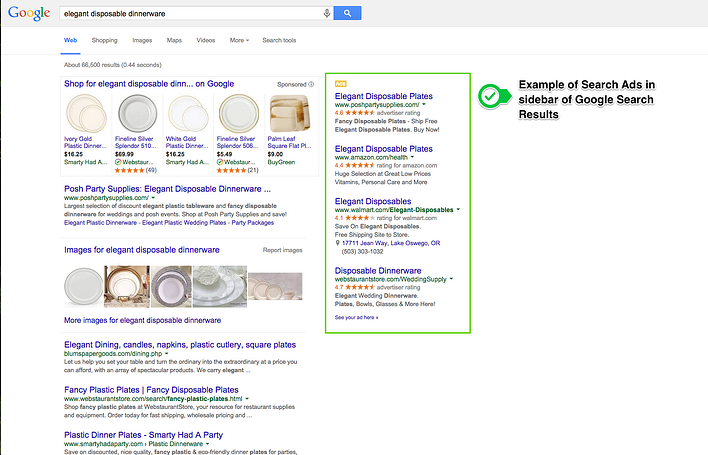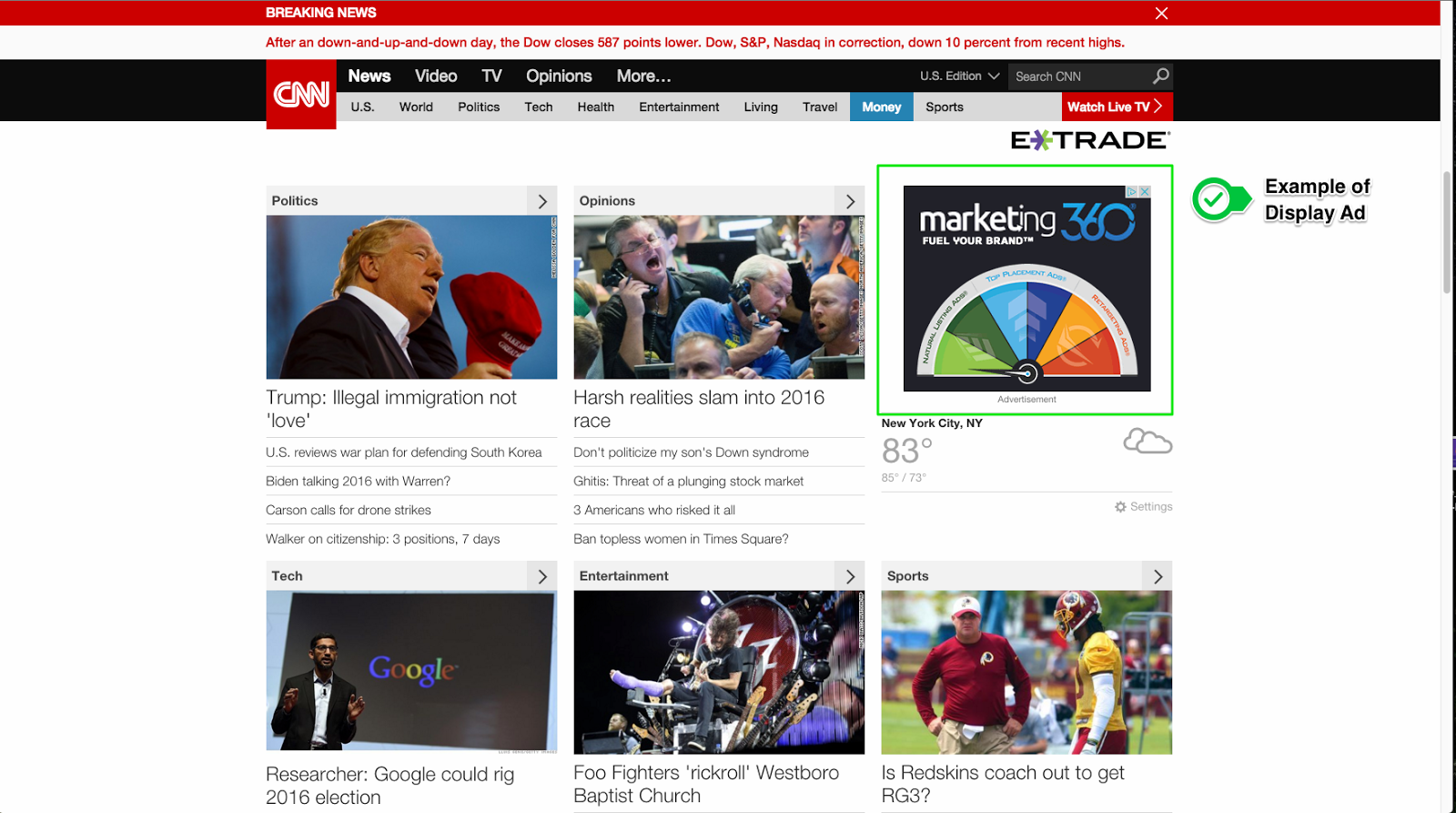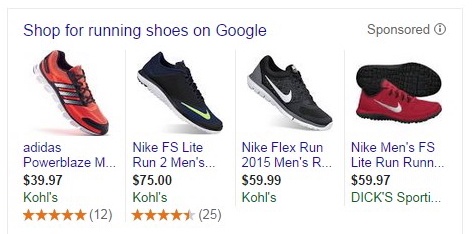You signed up for Google AdWords, and you are now overwhelmed by all the options. What is the difference between having a search campaign and a display campaign? If you are selling products, should you use search ads or shopping ads?
There are a lot of moving parts to every Google AdWords campaign, and the type of campaign you should run is just one facet of creating ads that work for you. But we have to start somewhere, so let’s start with the type of campaigns you can run on the Google AdWords network.
SEARCH CAMPAIGNS
If you have ever used Google, you have seen a search ad related to your search term. It is one of the most ubiquitous and successful ad formats used today and serves as the foundation of Google’s ad business.

What’s Unique About Search Campaigns?
There is a reason why Google Search campaigns are so successful for Google: they are successful for small businesses. “Search ads directly correlate with what the user is looking for than just what happens to be there.” said development manager Tyler Conlee.
Much of this success stems from Google’s huge wealth of data and its ability to let you target ads using numerous keywords with a variety of different matches. These matches help you predict how well your targeting preferences will perform and how much they will cost you. It’s ad money well spent if you can appropriately determine what your customers are searching for.
When You Should Use Search Campaigns
You should use search network ads under these circumstances:
-
When you are just testing the waters of pay-per-click advertising. Typically, search network ads have a more immediate return on investment.
-
When you have a range of products you want to sell immediately.
-
When you want a potential customer to respond to a call-to-action, such as filling out a customer form or signing up to an email list.
When You Shouldn’t Use Search Campaigns
While search network ads are the most popular form of ads, they don’t work for everyone. Do not use search network ads under these circumstances:
-
Just to increase traffic. This is throwing money down the drain. A landing page that directs visitors to conduct a specific action is the best use of a search ad campaign.
-
Avoid using PPC for branding purposes. While there are situations where this may make sense, typically brand recognition is measured by the number of people who viewed the ad instead of clicking on it.
DISPLAY CAMPAIGNS

First and foremost, display ads are used to increase brand awareness and recognition. These type of campaigns are most often used to remarket to past website visitors. For advertisers, display ads follow up closely behind search ads.
What’s Unique About Display Campaigns
Display ads are one of the best ways to make sure you are making the right people aware of your brand on the Internet. It is also a solution for retailers who do not have or want a robust e-commerce presence but want to reach their customers online.
“Display advertising allows you to capitalize on remarketing opportunities,” said graphic design Jaclyn Rainville. “It reminds your customers that you exist and strikes an emotional nerve with them.”
When You Should Use Display Campaigns
Use display ads for the following reasons:
-
To increase website traffic.
-
To increase offline sales.
-
Keep current and potential customers top-of-mind.
-
To target customers who are primed to have interest in your product.
When You Shouldn’t Use Display Campaigns
There are a couple reasons that display ads may not work for your business.
-
If you are targeting a very specific market.
-
If you are selling a product that serves an immediate need (such as an emergency plumbing service).
VIDEO CAMPAIGNS
Google AdWords for video allows you to run ads in Youtube search results, as well as before and after videos on Youtube and the Google Display network. You can target by demographic and also create remarketing campaigns.
What’s Unique About Video Campaigns
Video is a hot commodity on the web today. “The biggest benefit is creating the funnel and building awareness of your products,” VP of Paid Search Logan Bennett told us. “People consume a lot of video.”
And he is right.
There are over four billion video views on YouTube per day. This number is equally astounding on mobile, where there are over one billion views per day (those people must have found an unlimited data plan we don’t know about). In addition to these astounding numbers, video ads are still relatively new. That means there is a lot room for improvement and less competition.
When You Should Use Video Campaigns
There are many reasons you should consider using video ads as part of your digital marketing strategy:
-
People are increasingly spending their time watching video over other types of content available on the web.
-
Videos have a lot more potential to “go viral.”
-
You are only charged if a viewer has watched thirty or more seconds of your video ad.
When You Shouldn’t Use Video Campaigns
While there are a ton of benefits to having a video advertising strategy, it may not work best for everyone.
-
Creating a video that is high-quality and engaging can be costly.
-
Video ads are more difficult to update.
-
Video ads should be used, mainly, for brand awareness and recognition, not to drive immediate sales of a product.
SHOPPING CAMPAIGNS

Using a shopping campaign to sell your products is one of the more technically challenging ads you can create within the Google AdWords network. That said, it can pay off big for advertisers.
To create a shopping campaign, you will need to submit your product inventory to Google Merchant Center. To learn how to submit your data feed, follow these instructions provided by Google.
What’s Unique About Shopping Campaigns
The biggest advantage shopping campaigns have over search campaigns is the inclusion of an image and the specific product name and price. The actual merchant also gets prominent placing. In many ways, this is Google’s answer to Amazon.
When You Should Use Shopping Campaigns
While using a shopping campaign is a bit different from the AdWords norm, it has a number of benefits for your digital marketing strategy.
-
If you are a retailer with a large inventory.
-
If you want to create a unique ad for each individual product you sell.
-
If a visual is helpful to converting shoppers into paying customers.
When You Shouldn’t Use Shopping Campaigns
While shopping campaigns are a unique way to display your product, they might not always be necessary.
-
Not every industry performs well using shopping ads.
-
If you have low inventory (below 500 products), it may be difficult for you to compete.
-
Your website needs to be rock-solid (great landing page, secure payments, and easy-to-navigate).
Don’t go into Google AdWords blindly. Use this article as a jumping point for making the right decisions instead of the wrong investments.



